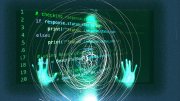Professor of psychology Matthew Nock studies suicide: what causes people to take their own lives; how to predict who will try; and how to prevent it from happening. Nock adapted the Stroop test and the Implicit Association Test—two computerized tests used for other purposes in psychology—to assess suicide risk. Watch the video below to see how these tests work. Read more about Nock's work—and find other relevant links, such as a tool for assessing self-injurious behavior such as cutting—in "A Tragedy and a Mystery," from the January-February 2011 issue (and the sidebar, "Studying Self-Injury"). See also "The Enigma of Suicide," a 1983 Harvard Magazine feature by George Howe Colt.
Video: computerized tests evaluate people's risk of attempting suicide
Video: computerized tests evaluate people's risk of attempting suicide
Learn about computerized tests that evaluate whether someone is at risk of attempting suicide. Plus, related links and an article from the magazine archives.
You might also like
How AI Is Reshaping Supply Chains
Harvard Kennedy School lecturer on using AI to strengthen supply chains
This Astronomer is Sounding a Warning on ‘Space Junk’
As debris accumulates in low Earth orbit, the danger of destructive collisions continues to rise.
Understanding AI Vulnerabilities
As artificial intelligence capabilities evolve, so too will the tactics used to exploit them.
Most popular
Explore More From Current Issue

For Campus Speech, Civility is a Cultural Practice
A former Harvard College dean reviews Princeton President Christopher Eisgruber’s book Terms of Respect.

A Near-Perfect Football Season Ends in Disappointment
A loss to Villanova derails Harvard in the playoffs.

Novelist Lev Grossman on Why Fantasy Isn’t About Escapism
The Magicians author discusses his influences, from Harvard to King Arthur to Tolkien.





